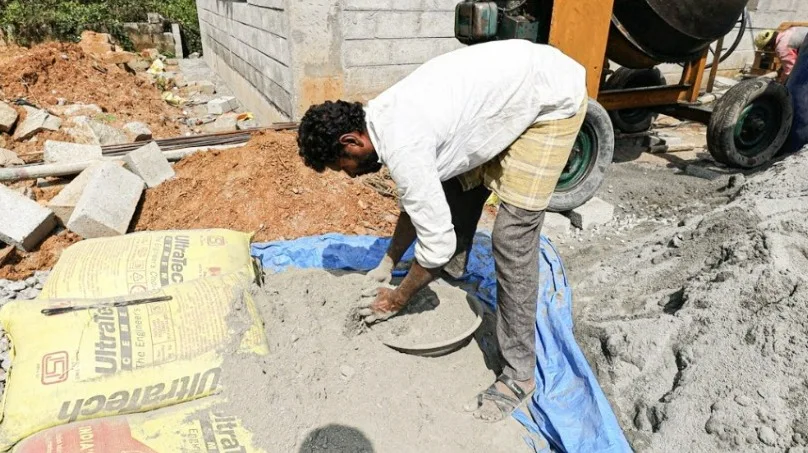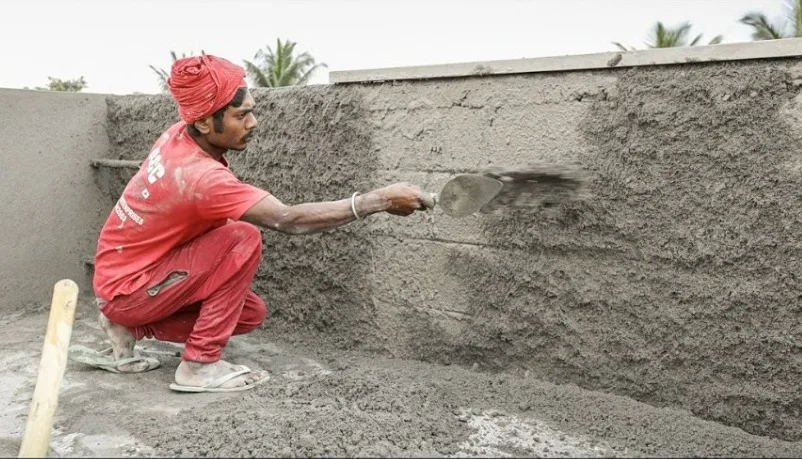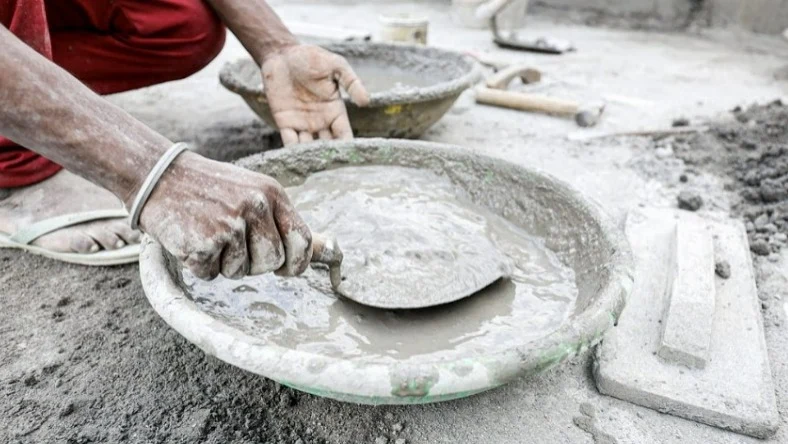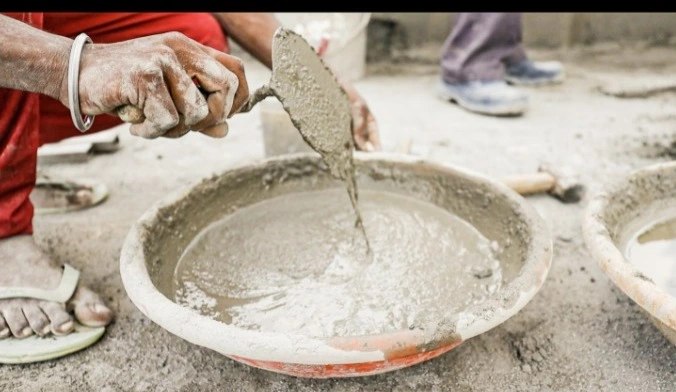Selecting the best cement to build a stable and strong building is one of the most crucial choices a builder must make to protect a building from all kinds of external disturbances out there. Generally, people planning to construct their homes are concerned about the cement quality used during construction. They only look up to using the best cement to build their homes.
Cement is one of the essential building materials for house construction. So, a person must know which cement is best for house construction and which brand of cement one should use for constructing a building. In this blog, we will address some of the questions that come up in your mind about cement when you think about house construction.
Which cement is best for house construction?
The following are the best quality cement in India used for house construction:
UltraTech Cement:
The renowned Aditya Birla Group owns this Ultra Tech cement company, the largest producer of grey cement. This cement company provides premium high-quality cement, including Portland pozzolana cement, Portland blast furnace slag cement, and normal Portland cement. The price of the UltraTech Cement depends on the grade and retailers. Till now, this cement is considered one of the best cement for house construction.
Ambuja Cement:
This company has been serving the cement production sector in India for more than two decades. Ambuja Cements’ success stems from producing high-quality cement, for which the company has received many awards. Additionally, the company follows environmental protection guidelines during cement production. The company’s production units are spread across different Indian states, including Maharashtra, Gujarat, West Bengal, Rajasthan, Chhattisgarh, and Himachal Pradesh.
JK Cement:
This famous cement-making company has gained popularity by providing developers with high-grade raw cement and cement products. The company is primarily known for producing the best cement for plastering. It has overtaken other brands in India to become the country’s second-largest producer of superior wall putty. The company offers a variety of cement brands, including J.K. White Cement, J.K. WallMaxx, J.K. Gypsomaxx, J.K. Super-strong Cement, and more.
ACC Cement:
It is one of India’s most trusted and reliable cement companies. In its 12 manufacturing facilities and 17 cement plants, ACC Cement uses advanced technology and innovative research methodologies to churn out the best cement. For those who need bulk cement for construction purposes, ACC Cement should be their ideal choice as it is one of the first cement companies globally to supply bulk cement.
Birla Cement:
This cement manufacturing company has ten units spread around the nation, focusing on east, north, and central India. The Birla Cement Company produces a variety of cement varieties, including fly ash-based, ordinary Portland cement, low alkali Portland cement, and Portland slag cement. This giant company produces one of the best quality cement in India.

Which grade of cement is best for house construction?
Right selection of cement grade is essential for ensuring strength, durability and safety when constructing a house. Cement in India comes in different grades, with each being suitable for certain types of construction projects. The most commonly available cement grades are 33 Grade, 43 Grade, and 53 Grade. Now let’s jump into the best grade of cement for building houses and why.
33 Grade Cement
In the past, often used in Indian residential buildings was 33 grade cement. After curing for 28 days it can bear compressive strength of up to 33 N/mm². Although sufficiently strong enough for use in general construction purposes its use has drastically reduced given that higher-grade cements are now available in the market. Today it is primarily used for plastering and some non-structural work.
43 Grade Cement
43 Grade cement is frequently employed more so in general residential constructions. Its compressive strength after curing reaches up to 43 N/mm² after the 28-day curing period. This grade is fit for the purpose of building homes where the structural load is not too high on them. It is widely used to make RCC (Reinforced Cement Concrete) structures i.e., beams, columns, slabs foundations, etc.. Furthermore, this type of cement also suits well as masonry work material or when plastering needs to be done using any other type of cement besides Portland Cement which must be used only at special places specifically outlined by the designer who in this case should not fail to specify that it must be Type I Ordinary Portland Cement (OPC).
Advantages of 43 Grade Cement:
- Versatile Use: Suitable for various types of construction work.
- Good Strength: Offers adequate strength for typical residential buildings.
- Cost-Effective: Generally more affordable than 53-grade cement.
53 Grade Cement
53-grade cement is the highest grade available and has a compressive strength of 53 N/mm² after 28 days of curing. This cement is used in constructions that require higher strength and durability, such as high-rise buildings, bridges, industrial structures, and heavy-duty infrastructure. For residential construction, 53-grade cement is ideal when you want to ensure extra strength, especially in critical areas like foundations and load-bearing columns.
Advantages of 53 Grade Cement:
- High Strength: Ideal for RCC work that requires more strength.
- Faster Setting Time: Leads to faster construction progress.
- Durability: Provides longer-lasting structures, making it ideal for buildings expected to endure heavy loads.
In conclusion, the choice between 43-grade and 53-grade cement largely depends on the specific needs of your construction. For standard residential homes, 43-grade cement should suffice, offering a good balance between cost and strength. For those seeking extra durability and strength, especially in key structural areas, 53-grade cement is the better option. Always consult with your contractor or structural engineer to determine the best grade of cement for your specific construction needs.
What are the uses of cement in building construction?
Cement is one of the best building materials and has no competitors in construction and implementation. The important uses of cement are as follows:
- The essential use of cement is making concrete and mortar
- Cement mortar is used for masonry work, plaster, pointing, etc.
- Floors, roofs, building lintels, beams, weather shelters, staircases, pillars, and other structures are all made of cement concrete
- Cement can be utilized for creating an instance, bridges, culverts, dams, tunnels, storage reservoirs, lighthouses, docks, etc.
- Cement can also be used to build telephone booths, tennis courts, septic tanks, lampposts, and other building structures
- Cement can be used for making fire-proof structures in the mould of concrete. It is also utilized for creating acid-resistance and waterproof structures

What is the difference between cement and concrete?
Despite the frequent confusion between the words cement and concrete, cement is an ingredient of concrete. Aggregates and paste are combined to make concrete. Sand, gravel, or crushed stone make up the aggregates, while water and portland cement make up the paste.
In terms of volume, cement makes up 10 to 15 percent of the concrete mix.
What are the types of cement used in India for house construction?
Usually, there are three types of cement used in India for house construction
Ordinary Portland Cement (OPC):
This cement is widely used for construction works. One of the advantages of this cement is that it attains strength in a very short period. This cement is available in three grades: Grade 33, Grade 43, and Grade 53.
Grade 33 and Grade 43 OPC cement are the old grades of cement that are used for constructing houses, and nowadays, these two grades of OPC cement are replaced by OPC 53 grade of cement.
OPC 53 grade cement is the best cement that is used for making concrete.
Portland Pozzolana Cement (PPC):
This type of cement is generally preferred by people for construction because it has a higher degree of fineness, impermeable, and corrosion-resistant quality. This cement is used in mass concreting work and RCC work. The strength of this cement is equivalent to OPC 53 Grade cement.
The advantages of this cement are as follows :
- PPC cement is cheaper than the OPC cement
- It has better resistance capacity against chemicals
- The workability of PPC is better than OPC
Portland Slag Cement (PSC):
It is a hydraulic cement made by grinding burnt furnace slag to suitable fineness and mixed with ordinary portland cement in a static ratio. Due to its high resistance capacity against sulphate attack, this cement is used in seawater construction projects. It is also used in mass concrete work like piles, dams, rafts, etc. The cost of this cement is low compared to OPC. Hence, it can be used in large volumes for construction purposes.

What is Portland cement, and what are its uses?
In simpler terms, Portland cement refers to a finely grounded powder that is made primarily of calcium silicates and, to a lesser extent, calcium aluminates. When mixed with water, it forms a paste that sets and hardens at room temperature.
The uses of Portland cement are as follows:
- Portland cement is used in construction to make concrete
- The majority of concrete masonry units contain Portland cement
- This cement is typically utilized in a variety of construction projects where the soil conditions are ideal, including dams, bridges, buildings, pavements, and other similar constructions.
- Typically, this cement is used for repairs and to fill up the wall and floor cracks
- In addition, Portland cement is used as a filler material, a plaster material, and a floor surface smooth material
- Portland cement is used in construction projects where the budget has to be minimized because this cement is less expensive than other cement
- Portland cement is used to prevent the risk of cracking. This cement has a good crack-resisting property
Describe the uses of different grades of cement
M5, M10, and M15 are generally used for plain cement concrete work leveling courses, bedding for footing, etc.
M20 is used for Reinforced cement concrete work, such as making slabs, beams, columns, footing, etc.
M25, M30, and M35 are used for creating foundations, footings, columns, beams, and slabs
M40 is used for pre-stressed concrete work, such as creating slabs, beams, footing, etc.
M45 & M50 make concrete roads, runways, RCC columns, pre-stressed concrete grinders, and beams.
M55 is used for making pre-stressed concrete grinders and piers
M60, M65, AND M80 are used for making high-rise buildings, ultra-thin white topping, and spillways
What are the factors to consider while buying cement for house construction?
Grade:
There are two grade variations of cement: grade 43 and grade 53.
In comparison to Grade 43, Grade 53 sets more quickly. But the short setting time results in micro-cracking. Therefore, it is perfect for projects requiring high early strength, such as RCC and high-rise buildings.
Grade 43 cement, on the other hand, is more durable and less prone to microcracking. Typically, grade 43 cement is used in Civil Engineering construction projects like plastering, flooring, and brick masonry, among others
Texture:
Verify that the cement is in the form of a fine powder and is free of granular lumps. When you touch the cement with your hand, it feels silky. On the other hand, hard lumps are a symptom of moisture in the bag.
Date of Manufacturing:
As cement loses strength over time, avoid purchasing bags with only 90 days left on the expiration date. The construction work will suffer when the lumps start to appear. Therefore, check the cement bags to see what week, month, and year they were manufactured.
Labeling:
The information on cement bag labels includes the type of cement, brand name, weight, date, ISI mark, and license number. Reading all these information guarantees that the cement bags meet the government-set quality standards.

How to check the quality of the cement used for construction?
The most important factors that need to be observed to know and check the quality of cement are as follows
Cement Color:
The cement should have a consistency in color. The perfect cement color should be light greenish-grey. The color of the cement indicates whether there is too much clay or lime mixed in the cement.
Check for Lumps:
Lumps are produced due to the presence of moisture in cement. When cement comes into contact with air moisture, a chemical reaction occurs; this process is known as hydration, and due to this lumps of cement paste are seen. The moment moisture is added to cement; it becomes ineffective.
Date of Packaging:
On the cement bag, you should pay attention to the manufacturer’s date. It is essential because cement loses strength over time.
Rubbing Test:
Always take a bit of cement in your hands and rub it between your fingers; the cement should become smooth while rubbing. If it is rough, sand and cement have likely been combined.
Floating Test:
Bring a volume of cement and put it in water; good and high-quality cement will always sink and not float on water.
Conclusion
The right cement brand helps you obtain better quality construction and saves money and time. We hope we can clarify most of your doubts regarding the cement required to build your dream home. If you have more queries regarding cement or want a free quote, your one-stop destination is Brick&Bolt.
Not only do we construct your dream home most amazingly with our tech-enabled features, but we also make sure to provide the best materials in the market. So, what are you waiting for? Connect with us today and get ready to watch your dream home being constructed hassle-free with India’s no1 construction company.

